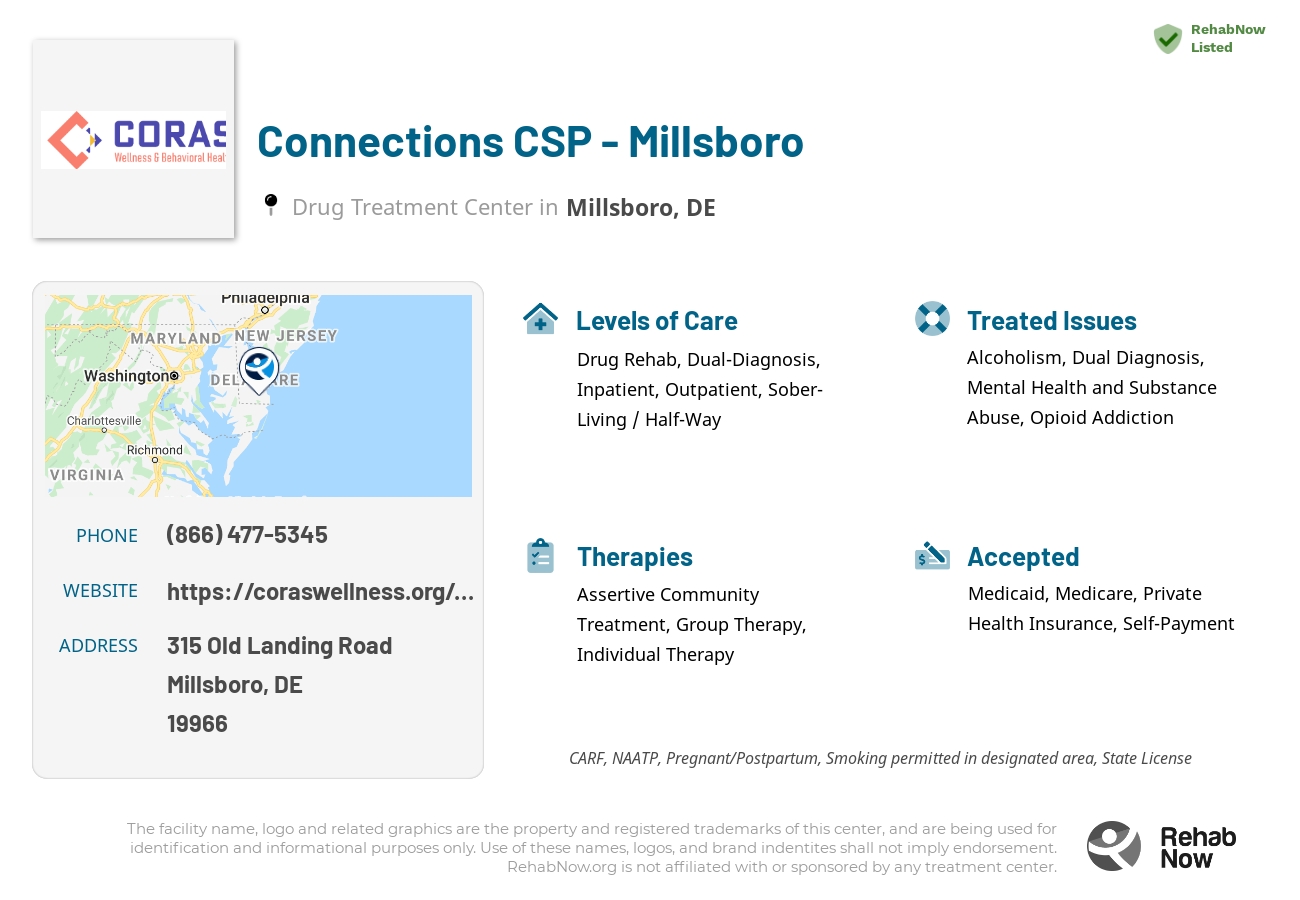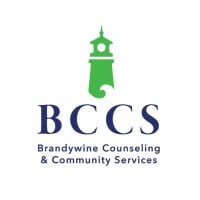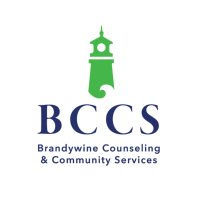
Connections CSP - Millsboro
Drug Rehab Center in Millsboro, Delaware
- Opioid Addiction
- Dual Diagnosis
- Drug Addiction
- Alcoholism
Connections CSP - Millsboro is an outpatient substance abuse and addiction treatment facility in Delaware that offers personalized care plans, a variety of treatment services, and specialized services like medication-assisted detox and court liaison, and has received various accreditations for the quality of their services.
About Connections CSP - Millsboro in Delaware
Connections CSP - Millsboro is an addiction treatment facility located in Millsboro, Delaware. Although the specific year of its founding is not provided, it has been serving individuals struggling with alcoholism, dual diagnosis, opioid addiction, and drug addiction for several years. They offer a diverse range of treatment programs and services, catering to individuals at different levels of care including inpatient, outpatient, and residential options. Connections CSP - Millsboro also accepts private health insurance for those seeking their assistance.
Connections CSP - Millsboroholistically treats individuals battling addiction by employing various effective methods and services. They provide drug rehab programs that aim to help people overcome substance abuse and dependency. In addition to this, they specialize in helping individuals with dual diagnosis, where they simultaneously address substance abuse and co-occurring mental health disorders. Connections CSP - Millsboro assists their patients through inpatient and outpatient treatment options as well as sober-living/half-way houses for those needing extra support post-rehabilitation. This center also emphasizes the importance of holistic care by offering comprehensive residential programs that focus on physical, mental, emotional, and social aspects of recovery.
Genders
Ages
Modality
Additional
Conditions and Issues Treated
Opioid addiction is when someone becomes addicted to opioids. This can happen quickly due to any opioid use. Opioid withdrawal can be uncomfortable and lead the user to continue using even if they want to quit. It’s best to receive inpatient treatment for detoxification.
Even if a person doesn’t need inpatient treatment, it’s recommended to start rehabilitation or at least some kind of outpatient treatment. This is because the withdrawal symptoms from opioids can be uncomfortable and unpleasant, to the point that a person could end up using again or worse.
Detoxification should be done to break the physical addiction of opioids. This can be done with opioid replacement therapy, medication-assisted therapy, or a more traditional detoxification program. Intensive outpatient treatment is a form of addiction care that allows patients to continue living at home while undergoing treatment. This type of care is appropriate for patients who have been treated in residential treatment programs. Intensive outpatient programs include regular visits to the facility providing therapy, and patients gradually return to their routine life. IOP benefits most when patients have a supportive family member or friend to help them recover.
The first step to getting into an intensive outpatient program is to attend a detoxification facility. Detoxification facilities are designed to remove substances from the body safely. The patient will attend sessions designed to help them understand their addiction and its impact on their lives. While in an intensive outpatient program, therapy sessions are scheduled three to five times per week, with the patient attending no more than two sessions in one day.
Dual Diagnosis therapy is considered more successful than traditional rehab methods because it treats the addiction and the underlying mental health disorder simultaneously. This comprehensive approach gives Millsboro, DE patients the best chance for long-term recovery. If the patient does not receive treatment for both conditions, they are more likely to relapse.
Levels of Care Offered
This center offers a variety of custom treatment tailored to individual recovery. Currently available are Drug Rehab, Dual-Diagnosis, Inpatient, Outpatient, Residential, Sober-Living / Half-Way, with additional therapies available as listed below.
Inpatient facilities offer a complete rehab program where the patient stays for an extended period. This allows the staff to monitor the patient on a round-the-clock basis and provide medical assistance if needed.
A significant benefit of inpatient rehab is that it allows for a safe environment for treatment. The patient doesn’t have access to drugs or alcohol, and they’re surrounded by people that want them to succeed and change their lives. Treatment starts with detox and behavioral therapy, followed by group therapy and family involvement.
Outpatient treatment consists of counseling and therapy sessions. The outpatient treatment process begins with the addict’s initial detox period, lasting about ten days. Outpatient treatment is used for those who are at moderate risk for “slipping back” into the addiction. It is also used for those who are not currently experiencing any side effects from withdrawal, can handle social pressure, have a stable living environment, and have a good support system.
Sober living homes are transitional houses for recovering addicts who need more structure than they would receive in an aftercare program. Specific rules and regulations are enforced in these homes, which are beneficial for people who need a greater degree of structure than other types of treatment.
Sober living home options include:
- Live-in managers – might be beneficial to people who do not have a support system in place at home, or who experience high levels of stress between work and home life.
- House managers – House managers are beneficial for people who do not have a strong social network to rely on, or who are concerned about relapse in their daily lives.
- House parents – House parents are beneficial to people who reside in areas without a strong aftercare program for support.
Residential treatment programs are those that offer housing and meals in addition to substance abuse treatment. Rehab facilities that offer residential treatment allow patients to focus solely on recovery, in an environment totally separate from their lives. Some rehab centers specialize in short-term residential treatment (a few days to a week or two), while others solely provide treatment on a long-term basis (several weeks to months). Some offer both, and tailor treatment to the patient’s individual requirements.
Therapies & Programs
Individual Therapy is a crucial component of addiction recovery. Therapists work with patients to identify the root of their addiction and figure out how to better handle the issues that led to them using drugs. Individual Therapy is one on one sessions where people meet with their therapist. Individual therapy provides a safe space for people to open up and discuss personal and sensitive topics which they may not feel comfortable discussing in a group setting.
In this type of therapy, therapists can develop specific solutions for each patient, which helps speed up their recovery process. In addiction recovery, therapy is a crucial part. It allows patients to go deep into their core issues and discover how those problems can be better handled now. Therapy can be performed in individual sessions as well as group settings. In individual therapy for addiction, the patient meets with the therapist one-on-one to focus on the underlying issues of addiction and come up with solutions to prevent future abuse.
Group Therapy is employed by drug treatment centers like Connections CSP - Millsboro to provide the recovering addict with a platform to talk about their feelings and experiences. It also provides for an opportunity to learn from other addicts who have successfully overcome their addiction. It is recommended that all group members be recovering addicts for this type of therapy to work.
Payment Options Accepted
For specific insurance or payment methods please contact us.
Is your insurance accepted?
Ask an expert, call (888) 674-0062
CORAS Wellness & Behavioral Health Associated Centers
Discover treatment facilities under the same provider.
- Connections CSP - Seaford in Seaford, DE
- Connections CSP - Millsboro in Millsboro, DE
- Connections CSP - Newark in Newark, DE
- Connections Community Support Programs - Wilmington in Wilmington, DE
- Connections CSP - Smyrna in Smyrna, DE
Learn More About CORAS Wellness & Behavioral Health Centers
Additional Details
Specifics, location, and helpful extra information.
Millsboro, Delaware 19966 Phone Number(866) 477-5345 Meta DetailsUpdated November 25, 2023
Staff Verified
Connections CSP - Millsboro Patient Reviews
There are no reviews yet. Be the first one to write one.
Millsboro, Delaware Addiction Information
The Delaware substance abuse statistics show that the number of deaths due to drug injury is higher than the national average. Over 16% of all deaths in the state between 2008 and 2017 were caused by drugs and alcohol. The state has been rolling out more services to address addiction in an effort to get help to those who need it.
Treatment in Nearby Cities
- Harrington, DE (28.0 mi.)
- Newark, DE (79.9 mi.)
- Camden-Wyoming, DE (39.1 mi.)
- Seaford, DE (17.7 mi.)
- Bear, DE (74.8 mi.)
Centers near Connections CSP - Millsboro
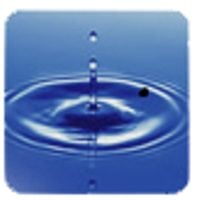
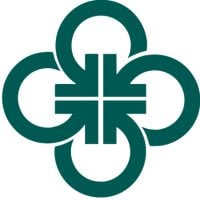

The facility name, logo and brand are the property and registered trademarks of Connections CSP - Millsboro, and are being used for identification and informational purposes only. Use of these names, logos and brands shall not imply endorsement. RehabNow.org is not affiliated with or sponsored by Connections CSP - Millsboro.

